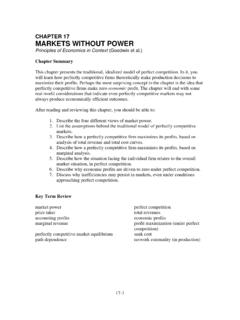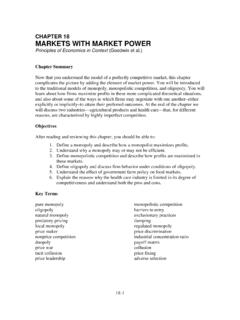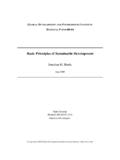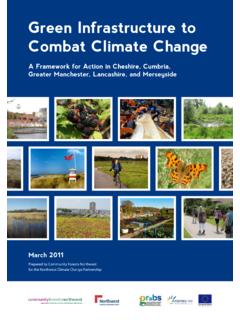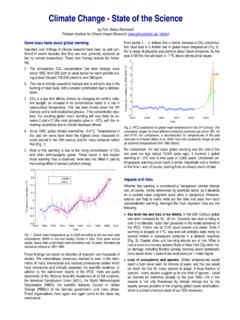Transcription of Critique of Cost-Benefit Analysis, and Alternative ...
1 Critique of Cost-Benefit analysis , and Alternative Approaches to Decision-Making A report to Friends of the Earth England, Wales and Northern Ireland Frank Ackerman 1. January 2008. Introduction Once upon a time, protection of human health and the natural environment did not seem to require economic analysis . Before the 1980s, public health and environmental policies were debated primarily on scientific, ethical, and legal grounds, with less emphasis on costs let alone monetized benefits . More recently, it has become the norm to assume the need for Cost-Benefit analysis of new policies, comparing monetary costs and estimates of the monetary value of benefits .
2 Just as a business should only make an investment if the expected revenues exceed the costs, the new approach suggests that government should only adopt a new initiative if its expected benefits exceed its costs. Although the theory can be traced back to the nineteenth century, the first applications of formal Cost-Benefit analysis by government occurred in water projects in the US in 1936, and in evaluation of road and rail transport options in the UK around 1960. 2 By the 1980s, the academic development of environmental economics coincided with the heightened interest in eliminating waste and promoting efficiency in government under the Thatcher and Reagan administrations leading to a much-expanded role for formal Cost-Benefit calculations both in the UK and the US.
3 Today it is often taken for granted that Cost-Benefit analysis is needed to ensure better regulation and avoid inefficiency in government. In an important recent example, climate change might seem like an issue where there is a clear need for science-based policy to avert global disaster. Yet the Government's response to public consultation on the UK climate change Bill 3 opens its argument with a short paragraph on the scientific case for action, followed by a much longer paragraph on the economic case for action; it then says, The climate change Bill will provide a clear, credible framework to support emissions reductions in the UK, in a way which maximises the social and economic benefits and minimises costs.
4 4 The response repeatedly suggests that future changes in the carbon reduction goals should be based on the economic costs and benefits of any new targets. 1. Global Development and Environment Institute, Tufts University, Medford MA 02155, USA; e-mail 2. David Pearce, Cost-Benefit analysis and Environmental Policy, Oxford review of Economic Policy 14. no. 4 (1998), 84-100. 3. Taking Forward the UK climate change Bill: The Government Response to Pre-Legislative Scrutiny and Public Consultation, October 2007, . 4. Ibid., While the discussion of the climate change Bill has accepted for now that the Stern review makes a clear economic case for immediate action, the reliance on economic rather than scientific standards leaves the door open for later reconsideration.
5 If Stern's conservative critics within the economics profession 5 were to prevail in subsequent debates, the logic of maximizing monetary benefits and minimizing costs could lead to intentionally leaving ourselves unprotected against the worst impacts of climate change . The argument of this report is that Cost-Benefit analysis is a flawed procedure, which should not be central to public policy decisions on climate change or other issues. In practice, Cost-Benefit analysis exhibits numerous problems, ranging from deep ethical and logical contradictions to a persistent tendency toward forecasting errors and partisan abuse.
6 Some of these flaws could in theory be corrected; others are inherent in the methodology, and underscore the need for alternatives . Other, equally logical approaches to decision-making are available; these Alternative approaches have the added advantage of acknowledging the multidimensional complexity of environmental issues and the inescapable role of uncertainty. Case studies of policies for airport expansion and for waste management, presented below, illustrate the weakness of Cost-Benefit analysis and the need for alternatives . The report begins in Section 1 with a review of the flaws in cost benefit analysis .
7 Section 2 sets out Alternative approaches. Sections 3-5 present case studies of how decisions happen in practice and how alternatives could work. Section 6 offers some conclusions for policy makers. I. Six flaws in Cost-Benefit analysis It is surprising that Cost-Benefit analysis is such a failure; at first glance, it appears quite reasonable. Making decisions about public policy is a complicated process, facing the continual challenges of too many rival proposals and too little time and resources. If only one could assign monetary values to all the costs and all the benefits of a proposed policy, it would become a simple, transparent matter to add up the costs and benefits .
8 Then there would be a strong argument for adopting a proposal if and only if the value of its benefits exceeded its costs. Everyone, on some level, weighs the costs and benefits of possible actions when deliberating what to do next; Cost-Benefit analysis looks like a natural extension of this commonplace activity to public life. But consider a different picture of Cost-Benefit analysis in practice. When important benefits are not defined in monetary terms, economists often resort to implausible, circuitous methods of inferring and inventing the missing prices.
9 When future outcomes are uncertain, analysts use "best guess" values, ignoring the concerns about worst case hazards that motivate many policy debates. When the measurement of costs and benefits becomes a complex, detailed process, the calculation loses transparency and often 5. See Frank Ackerman, Debating climate Economics: The Stern review vs. Its Critics, report to Friends of the Earth, July 2007, . 2. objectivity as well, as partisan interests learn to cloak their agendas in the opaque technicalities of the evaluation. This is not just a hypothetical scenario.
10 It is what has actually happened in the United States, above all in the approach to environmental regulation under President George W. Bush. This section argues that many of the absurdities and biases seen in recent American applications of Cost-Benefit analysis flow directly from the methodology. Alternative methods for rational deliberation on public policy are presented in the next section. Pricing the priceless The costs and benefits of health and environmental policies are not normally expressed in comparable units. The costs are frequently well-defined in economic terms: it is a straightforward process to calculate the price of end-of-pipe filters that reduce industrial emissions, or highways that go around instead of through nature preserves, or new energy-efficient equipment that reduces fossil fuel use and greenhouse gas emissions.




